|
|
 |
An independent summary of the world
news seen from the Pacific
The Independent New York Times
Tokelau, Saturday,
December 6,
2008 Weekend Edition, editor
- contact sumpinein@gmail.com
|
 |
|
|
|
|
FLIGHTS RESUME AT BANGKOK AIRPORT |
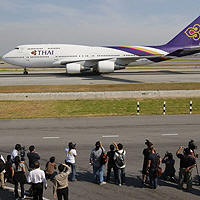 |
|
BRITAIN TO JOIN
EURO? |
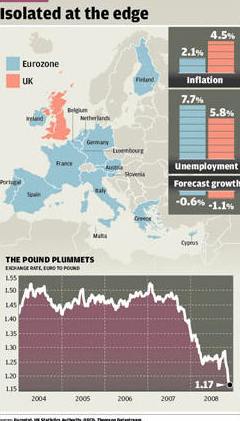 |
|
This band
incarnates the traditional
values of Cajun music in the
USA. The Cajuns live mainly in
Louisiana and are the
descendants of Acadian exiles.
Today, the Cajuns make up a
significant portion of south
Louisiana's population, and have
exerted an enormous impact on
the state's culture. |
|
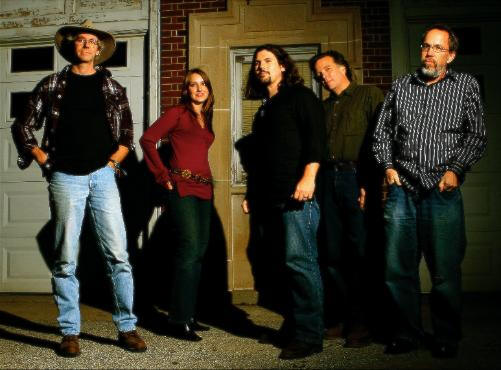 |
|
Every now and
again a band comes along that redefines
a genre of music and carries it even
further...that group is Dennis
Stroughmatt and Creole Stomp. Always
leaving audiences wondering "who are
they?," and "where do they come from?,"
Dennis and CS are based in southern
Illinois and happily tell audiences "we
are from upper Louisiana." While this
may bring chuckles from many and nodding
heads from others "in the know," this is
the group that does represent "old upper
Louisiana." Dennis learned to speak
French and play French Creole music in a
southeast Missouri French Creole
community before moving to the state of
Louisiana. After returning to Illinois
from Louisiana, Dennis began a long
odyssey that eventually culminated in
the forming of Creole Stomp in 2002. And
since that time he and his band have
carried the torch of French Creole music
and culture across North America
performing a blend of music from the
state of Louisiana and old upper
Louisiana. Their unique sound and mix
of ancient and modern Mississippi River
valley musical tradition positions them
as the only band to encompass French
Creole and Folk Music from the entirety
of the old Louisiana Territory. And
although Dennis continues to play with
many of his Louisiana based friends on
occasion, you can always find him at the
helm of Creole Stomp playing
somewhere from San Diego to Boston |
 |
|
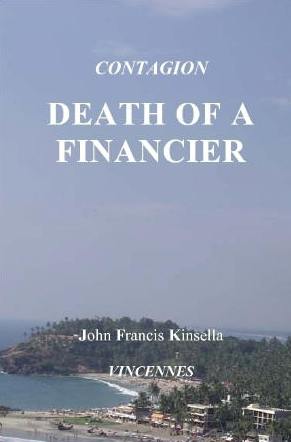
|
Read DEATH OF A
FINANCIER by JOHN
FRANCIS KINSELLA |
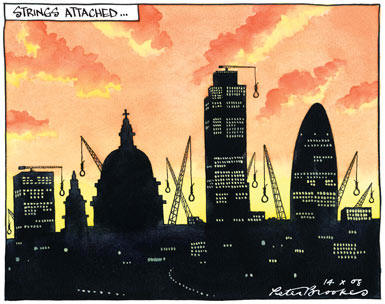
|
Tom Barton, a City
mortgage broker, decides
to quit his business in
the wake of the subprime
crisis and arrives in
Kovalam, in the south of
India. In the Maharaja
Palace he finds himself
in the company of
holiday makers from the
UK, Scandinavia and
Russia. Stephen Parkly,
the CEO of a successful
City bank, and his young
wife Emma are taking a
well earned year end
break. Parkly falls
gravely ill with a
mysterious infection,
whilst back in the City,
unknown to him his
mortgage and investment
bank, West Mercian
Finance is in grave
difficulties. Ryan
Kavanagh, a doctor,
comes to Emma’s aid with
the help of Barton,
after an attempted
cover-up by the Indian
authorities, who fear
for their tourist
industry and more
especially medical
tourism, as the disease
threatens the resort
with the tourist season
in full swing. Thousands
of British tourists
enjoying the sun are
unaware of the pending
disaster, many are
equally unaware their
savings about are to be
wiped out in the West
Mercian collapse. |
|
OR PRINT
VERSION
FROM
| More books by John Francis Kinsella from Vincennes Books: Borneo Pulp, The Legacy of Solomon, Offshore Islands, The Lost Forest |
|
|
|
|
Could
this be the world's
oldest living creature? |
 |
|
The span of history
a giant tortoise can
live through is vividly
illustrated in a
remarkable picture on
the British island
colony of St Helena in
the year 1900.
One of the men behind
them (in our second
picture) is believed to
be an Afrikaner captured
during the Boer War,
which lasted from
1899-1902. The remote
South Atlantic island,
the final prison of
Napoleon from 1815 until
his death there in 1821,
later housed a Boer War
prison camp holding
6,000 inmates. The scene is thought
to be the grounds of
Plantation House, the St
Helena governor's
residence in the island
capital of Jamestown,
where three giant
tortoises were brought
as ornamental pets from
the Seychelles in the
Indian Ocean in 1882.
The animals may have
been 50 years old then,
and so would be about 70
when the photo was taken
– and one of the three,
named Jonathan, is still
alive. At a possible age
of 175-plus he would be
the world's oldest
living animal. The
previous oldest-known
tortoise was thought to
be Harriet, a giant
Galapagos land tortoise
who died, aged 175, in
2005 in Australia.
|
|
|
|
BANGKOK AIRPORT SIEGE
ENDS |
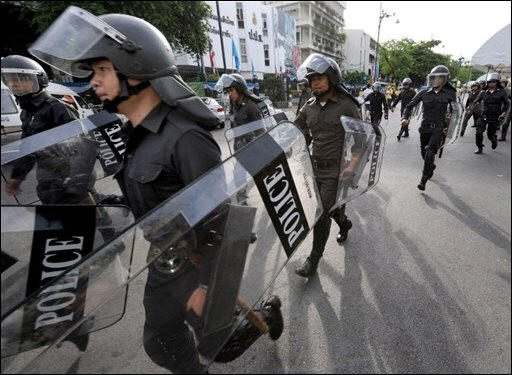
|
The first
passenger flight
into Bangkok's
Suvarnabhumi
airport since
anti-government
protesters
lifted an
eight-day
blockade on
Wednesday landed
at around
2.15pm. The Thai
Airways flight
was carrying 305
passengers from
the southern
resort island of
Phuket. Flag
carrier Thai
Airways said in
a statement that
six flights
would leave the
main
Suvarnabhumi
international
airport on
Wednesday and
early Thursday,
flying to
Sydney, New
Delhi, Narita,
Frankfurt, Seoul
and Copenhagen.
Mr Vudhibhandhu
Vichairatana,
chairman of the
board of
Airports of
Thailand, said
that full
operations would
resume at
Suvarnabhumi on
Thursday. 'We
will try and get
everything back
to normal as
soon as
possible,' he
told reporters
at the airport
as protesters
from the
anti-government
People's
Alliance for
Democracy, PAD,
packed up their
belongings and
trickled out.
Flights had been
landing at the
U-Tapao naval
base south-east
of Bangkok,
which has been
standing in as
the main exit
point for
travellers, who
have also been
escaping from
Chiang Mai in
the north and
Phuket. Hundreds
of PAD
supporters
started leaving
the airport in
cars, taxis and
buses after the
10am time
set by PAD
leaders for the
end of their
protests at
Suvarnabhumi and
other sites.
They gave up
their siege of
Suvarnabhumi and
the smaller Don
Mueang domestic
airport after a
court dissolved
the ruling party
and forced out
the prime
minister, one of
the key demands
of the PAD. --
AFP, REUTERS |
|
A Mumbai
terrorist
captured
by
police
has
confirmed
to
interrogators
that a
woman in
Islamic
dress
guided
him
around
the city
before
and
after
the
attackers
went on
a
shooting
spree. |
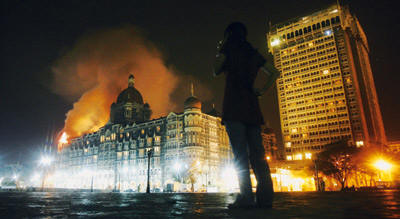 |
|
Investigators
said that an
urgent alert had
been issued to
officers to find
the woman
referred to by Azam Amir Qasab
as "sister."
Eyewitnesses had
seen Qasab
buying dried
fruit with the
burqa-wearing
woman near
Mumbai's main
train just
minutes before
the attack was
launched.
Residents near
the Cama
hospital, which
was attacked by
Qasab and a
partner Abu Dera
Ismail Khan, had
said a woman
helped Qasab
after the attack
on the station.
A shopkeeper
also insisted at
least one woman
had accompanied
the pair. "The
man started
firing towards
the hospital
immediately
after entering,"
said one
eyewitness.
"Moments before,
the woman, in a
salwar kameez
underneath her
burqa, had even
tried to enter
the hospital by
climbing a water
pipe. As the man
continued
firing, the
woman, who
wasn't armed,
knocked on one
of the houses.
They then asked
the family for
water." While
Qasab and his
fellow gunman
were cornered in
a police ambush,
the woman got
away. Officials
said drug
paraphernalia,
including
syringes, was
recovered from
the scene of the
attacks, which
killed almost
200 people. The
heavily built
men, who had
undergone
training at a
special marine
camp established
by the
Lashkar-e-Taibat
(LeT) terrorist
group in
Pakistan, had
also used
steroids to
build a tougher
physique. "We
found injections
containing
traces of
cocaine and LSD
left behind by
the terrorists
and later found
drugs in their
blood," said one
official. "There
was also
evidence of
steroids, which
isn't uncommon
in terrorists.
"These men were
all toned,
suggesting they
had been doing
some heavy
training for the
attacks. This
explains why
they managed to
battle the
commandos for
over 50 hours
with no food or
sleep." One
terrorist used
the drugs to
keep on fighting
despite
suffering a
life-threatening
injury. Drugs
are commonly
used in India by
workers in jobs
where a lack of
sleep is
demanded, such
as truck drivers
and security
guards. |
|
|
|
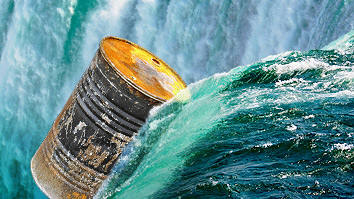 |
|
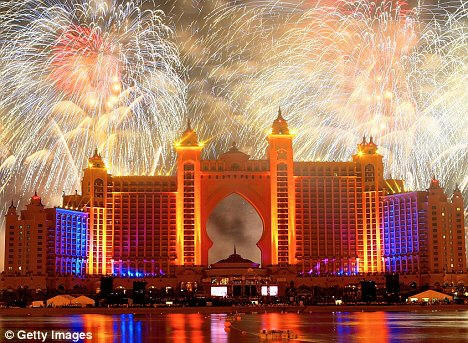 |
|
A visit to the
Hotel Atlantis
in Dubai in the
summer of 2007
saw 12,000
workers toiling
in 45-degree
heat to build
the 1500-bedroom
hotel at the top
of the crescent
of man-made land
that guards the
Palm Jumeirah.
More than 30,000
limes were
handed out that
day to help the
parched builders
cope with the
heat. Nearly
7000 of the
workers employed
by UK contractor
Laing O'Rourke
lived in a vast
camp on the
site. Last week
2000 "world
celebrities"
were shipped in
to a £13 million
launch party of
the hotel. The
guests included
Oprah Winfrey,
Robert De Niro
and a large
number of
celebrities
unrecognisable
to anyone aged
over 50. A
well-covered
Kylie Minogue
did her
rear-wiggling
act. Large
numbers of
fireworks
exploded into
the night sky.
Now the party is
over. Not just
for Sol Kerzner,
the South
African
billionaire who
half owns the
£750 million
hotel, but also
of course for
Dubai itself,
which owns the
other half,
through its
investment arm
Istithmar. In
the space of a
few weeks the
stock market has
collapsed, along
with property
prices. The
exodus of UK
architects,
engineers,
surveyors and
builders is
about to begin
as each of the
big developers
begins to fire
expatriate
staff. Over 600
are reported to
have been let go
in the past
week. On Tuesday
Mohamed Alabbar,
a member of
Dubai's
executive
council and
chairman of
Emaar
Properties,
confessed the
government and
its
state-affiliated
companies had an
$80 billion (£52
billion)
overdraft, which
is nearly 150%
of the gross
domestic product
of this tiny
state. Alabbar
said that
Dubai's three
largest property
companies will
now have to hang
together rather
than hang apart.
His own company
Emaar, which is
building the
Burj Dubai, the
world's tallest
building, will
now collaborate
with Nakheel,
which built the
palm islands off
the Dubai coast,
and Dubai
Holdings, the
government's
property unit.
The three
control 70% of
Dubai's property
development
industry, an
industry now in
very deep
trouble. In the
summer of 2007
it was perfectly
obvious that
Dubai was
heading for a
crash. Everybody
knew. But nobody
wanted to say it
out loud. They
knew because
there were plans
on the table to
build enough
office space for
half a million
workers by 2010.
The population
of Dubai is no
more than two
million. They
knew because
there were plans
to build 153,000
flats and villas
by 2010. That is
a whole lot more
homes than
Britain will
build next year.
Like here,
prices are
falling, down
40% on the Palm
Jumeirah in the
space of a few
weeks. And there
are still plenty
of flats left in
the world's
tallest tower,
where work is
due to finish
next year. On
the 25th floor
you can buy a
one-bedroom
unit, priced now
at a "reduced"
£1.3 million.
Plans for an
even taller
tower announced
only weeks ago
suddenly look
stupid. As does
the idea of
local developer
Tanweer of
building a giant
Ferris wheel in
a five million
square feet
entertainment
park in
cooperation with
Hollywood studio
DreamWorks. The
Dubai dream is
over. Even Sol
Kerzner
recognised that.
"If I had to do
the party all
over again, I
might do it
recognising the
fact that we're
living through a
bit of a tough
economic
environment." |
|
TEHRAN: An
Iranian man has been
sentenced to be blinded
under Islamic laws in
retribution for blinding
a woman by throwing acid
on her face for
rejecting his marriage
proposal, press reports
said on Thursday.
A Tehran criminal court
on Wednesday issued the
ruling against the
jilted suitor identified
as Majid, 27, who
confessed to throwing
acid on Ameneh Bahrami's
face four years ago,
Kargozaran newspaper
said.
Despite years of
treatment in Spain,
Bahrami has lost sight
in both eyes and still
bears serious injuries
to the face and body,
the report said.
The newspaper did not
say whether the convict
would appeal against the
ruling that he also be
blinded by acid.
Under the Sharia-based
law practised in the
Islamic republic, those
convicted of causing
intentional physical
injury are punishable by
"qisas", or the
eye-for-an-eye Islamic
penalty.
|
|
BANK OF ENGLAND CUTS
RATES |
|
The Bank of England has
slashed interest rates
by another 1% as
policymakers stepped up
their battle to stave
off a deep recession.
The dramatic percentage
point cut takes the cost
of borrowing from 3% to
2% - a rate not seen
since 1951 and equal to
the all-time record low
in the UK. It follows
last month's shock 1.5%
cut - the biggest for
more than 27 years - and
comes amid mounting
concern that the UK is
facing a deep and
prolonged recession.
Rates have not been
below 2% since the Bank
was formed in 1694 but
economists said it was
now only a matter of
time before they are cut
again. Britain's biggest
mortgage lender Halifax
confirmed it would pass
on the cut to its
600,000 borrowers with
base rate tracker deals.
But it is unlikely that
all borrowers with
standard variable rate
mortgages will see the
full benefit, despite
increasing pressure from
the Government. At the
same time the EU Central
Bank cut its rates by
0.75% to 2.5%. The pound
sterling fell to under
1.15 euros whilst China
has let the yuan slide
to prop up its faltering
economy just as Paulson
asked for a stronger
Chinese currency. |
|
|
Barack
Obama’s grandfather was imprisoned and
brutally tortured by the British
|
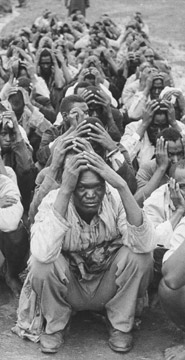 |
| Barack Obama’s
grandfather was imprisoned and brutally
tortured by the British during the
violent struggle for Kenyan
independence, according to the Kenyan
family of the US President-elect.
Hussein Onyango Obama, Mr Obama’s
paternal grandfather, became involved in
the Kenyan independence movement while
working as a cook for a British army
officer after the war. He was arrested
in 1949 and jailed for two years in a
high-security prison where, according to
his family, he was subjected to horrific
violence to extract information about
the growing insurgency. |
|
HORSE
PLAY |
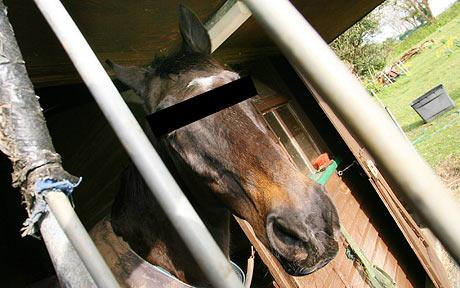 |
| Leeroy Le Gallais, 46, broke
into the animal's stable on two
separate occasions to perform
sex acts on the terrified
animal. During his first attack
he used a bucket to stand behind
the horse, called Calico, but
was caught after leaving his
underwear at the scene. He was
given a three-year probation
order, but just months later
returned to have sex with the
same horse at the Castel Stable
in Guernsey. On the night of the
second attack, on April 25 this
year, Calico's owner Michael
Wortley checked on the animal in
his stable at 6.30pm. The
20-year-old bay gelding was
covered with a blanket but when
Mr Wortley returned in the
morning the blanket was on the
floor. A mounting stool that was
left outside the stable had been
taken inside and police
immediately suspected Le Gallais
was responsible. Le Gallais, of
St Peter Port, Guernsey, was
jailed for three years at
Guernsey's Royal Court after
admitting having sex with the
animal. He told the court: "I
had a few beers, I went to the
stable and interfered with the
horse." Le Gallais said his
second attack came after he ate
in a restaurant and drank a few
glasses of red wine before
visiting a bar. Le Gallais
initially denied any knowledge
of the matter but when told by
police that forensic samples had
been taken he admitted going to
the stable. Sentencing him to
three years, Judge Russell
Finch, said Le Gallais was not
of previous good character and
the probation order breach was
an aggravating factor.
|
|
|
CHINA DEVALUES |
|
The central bank
has shifted the
central peg of
its dollar band
twice this week
in a calculated
move that
suggests Beijing
aims to offset
the precipitous
slide in Chinese
manufacturing by
trying to gain
further export
share abroad.
The futures
markets are
pricing in a 6pc
devaluation over
the next year.
"This is clearly
a big shift in
policy and we
are now on
alert," said
Simon Derrick,
currency chief
at the Bank of
New York Mellon.
The move follows
a Politburo
speech by
President Hu
Jintao warning
that China is
"losing
competitive edge
in the world
market".
|
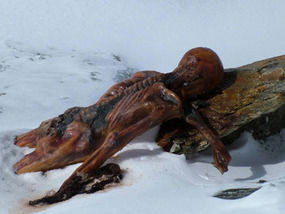
|
A
5,300-year-old
mummified
iceman
unearthed
in the
Alps
may have
been
carrying
a
prehistoric
version
of tin
foil and
an
ancient
first
aid kit.
Scots
researchers
found
fragments
of
different
mosses
in the
stomach
of Oetzi,
whose
remains
were
found in
the
Italian
Alps in
1991.
The
discovery
baffled
scientists,
as
mosses
have no
nutritional
value
and
would
not be
eaten.
But
analysis
has
revealed
he may
have
used one
type of
moss,
known to
have
antiseptic
properties,
to dress
a wound.
Another
type
could
have
been
used to
wrap a
snack of
red deer
and ibex
meat,
like a
Neolithic
version
of tin
foil.
Professor
James
Dickson,
senior
research
fellow
from the
University
of
Glasgow,
revealed
Oetzi is
the
first
glacier
mummy to
have
fragments
of
mosses
in his
intestine.
He said:
“Mosses
are not
nutritious
or
palatable,
so you
can’t
say he
was
eating
it. My
explanation
is that
it was
in
contact
with the
food he
was
carrying
or
perhaps
wrapping
it.”
Oetzi
had
suffered
a deep
gash on
his
right
hand
shortly
before
he died
and a
fragment
of
Bogmoss
discovered
in the
stomach
may have
been
used for
its
antiseptic
properties.
Professor
Dickson
said:
“Bog
mosses
were
used as
wound
dressings
right up
until
the
Second
World
War. “We
don’t
know if
prehistoric
people
knew of
these
properties,
but my
opinion
would be
that
they
did.”
|
|
|
|
|
INDIAN NAVY DESTROYS THAI FISHING TRAWLER |
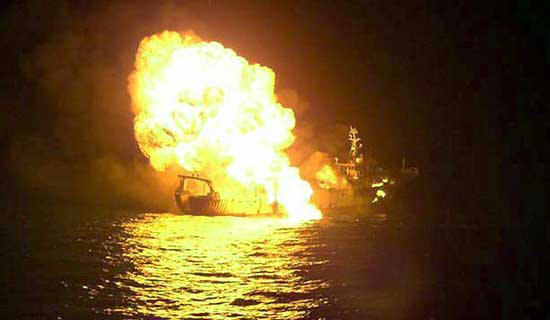 |
|
The alleged pirate ship that was blasted
out of the water by the Indian Navy in
the Gulf of Aden last week was actually
a legitimate Thai fishing trawler that
had been seized by pirates earlier in
the day, the boat's owner
said Wednesday. The hijacking of the
Ekawat Nava 5 far out at sea; its
apparent and immediate conversion to a
"mother ship" for the pirates; the
gunfight that led to its fiery night
time
sinking; and the harrowing tale of a
lone surviving crewman illustrate the
dangers and the legal undertow that
surround many of the recent hijackings
in East African waters. The Ekawat Nava 5, with a crew of 16,
was hijacked on the morning of Nov. 18,
according to Wicharn Sirichaiekawat, the
managing director of Sirichai Fisheries,
which owns the boat. The boat had a GPS tracking device on
board, Wicharn said by telephone from
Bangkok. The company immediately
reported the hijacking and the boat's
location to the International Maritime
Bureau in Kuala Lumpur, the
clearinghouse for reports of piracy. The bureau broadcast the news of the
hijacking to various ports, other ships
in the area and the coalition of navies
that helps maintain a maritime security
corridor in the gulf. |
|
|
|
|
|
GM IN FREE FALL |

|
General Motors
Corp reported a
41 percent drop
in overall U.S.
sales for
November, saying
continued
economic
uncertainty was
hurting consumer
confidence.
The sales
results,
reported on
Tuesday, came as
the No.1 U.S.
automaker was
set to submit an
extensive
restructuring
plan to Congress
in support of a
$25 billion
rescue package
for the auto
industry. GM
sold 154,877
vehicles in the
U.S. market in
November,
compared with
263,654 a year
earlier. The
company said it
was extending a
"Red Tag" sale
with lower
vehicle prices
and cash-back
offers through
Jan. 5. GM
expects
first-quarter
2009 production
in North America
to be down 32
percent from a
year earlier,
based on a plan
to build 600,000
cars and trucks
in the period,
it said. "The
consumer is
scared and
sitting on the
sideline. We
need appropriate
economic
stimulus to get
the consumer
back in the
game," GM U.S.
sales chief Mark
LaNeve said in a
statement. GM
estimated that
industry wide
U.S. vehicle
sales dropped 34
percent in
November,
extending a
downturn that
has accelerated
amid financial
market turmoil.
|
|
Celebrity
crunch: property
firm to the
stars, aAim,
goes bust |
 |
|
The
plummeting
property market
claimed a host
of celebrity
victims
yesterday when
companies whose
investors
include Sir Alex
Ferguson, Sir
David Frost and
Grant Bovey
collapsed into
administration.
The Times has
learnt that aAim,
a £3 billion
property
investment
company backed
by HBOS and
chaired by Sir
David, has gone
into
administration.
It is feared
that
shareholders
will lose all
their
investments.
aAim spent
billions of
pounds on
properties in
Britain and
mainland Europe,
before the
market fell last
summer. Property
prices in
Britain have
dropped by as
much as 35 per
cent since then.
AAim had a
number of
well-known
sponsors. Sir
Alex, the
Manchester
United manager,
was still listed
as a founder
shareholder and
investor last
night. “I have
been impressed
by the energetic
team, their
clarity of
vision and by
the consistent
high returns
they have
delivered,” Sir
Alex is quoted
as saying.
|
|
|
HILLARY
CLINTON
APPOINTED
OBAMA'S
SECRETARY OF
STATE |
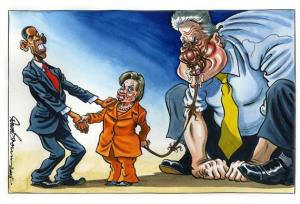
|
|
|
SCENES OF BLACK FRIDAY STAMPEDE
AFTER US CELEBRATION OF
THANKSGIVING |
|
|
|
UNCLE
SAM RULES THE WAVES |
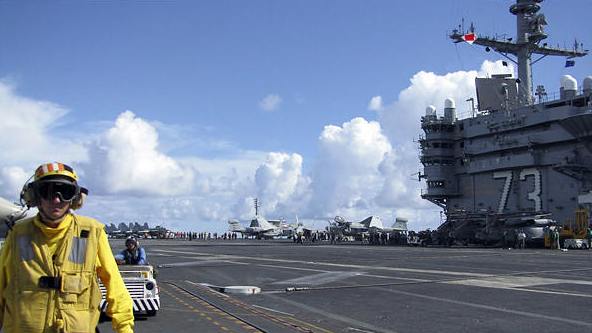 |
|
|
The nuclear powered
aircraft carrier George Washington is the crown jewel of the
U.S. Seventh Fleet, a huge armada of 60 to 70
ships, 200 to 300 aircraft and 20,000 sailors
and Marines. Most are, like the GW, based just
south of Tokyo. One of the primary missions of
the floating airbase is to "sanitize" the seas
around it, using active and passive sonar,
helicopters and an array of secret gadgetry. |
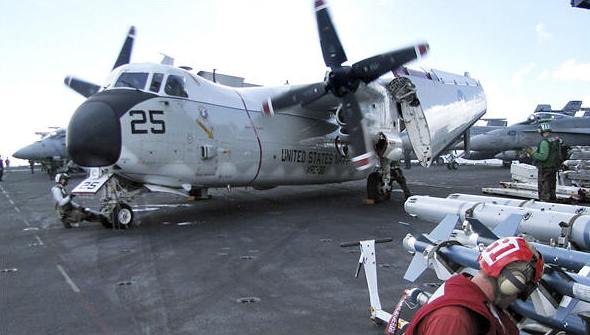
|
|
CORPORATE JET CUT BACKS |

| It is the great company jet fire
sale. Everything must go – and quickly.
For the credit-crunched giants of
corporate America, living on the
generosity of the taxpayer, it ill
behoves executives to fly luxury class,
and a string of expensive aircraft are
finding their way on to the market.
The bosses of the big three Detroit
car-makers were making a
self-flagellating road trip yesterday
from Motor City to Washington, where
they will plead for a $34bn (£23bn)
government hand-out this morning, a
fortnight after being ridiculed for
turning up at their last meeting on
$20,000-per-flight corporate jets. And
Citigroup, which just 10 days ago palmed
off up to $306bn in potential losses on
to the US government, was also reported
to be selling two of its fleet of
aircraft, decked out with lush dining
chairs and a well-stocked kitchen. The sales threaten to usher in an era
of penury for a cadre of executives who
are used to flying on the company jet
not just for business trips but also on
holiday. For the American public, bitter
at forking out more than $1trn so far
during the credit crisis to bail out
Wall Street banks and other companies,
it offers one small signal that
boom-time corporate excess is being
curbed. A small Maryland broker is hawking
two Dassault Falcon jets understood to
belong to Citigroup, the banking giant
brought to the brink of bankruptcy last
month by billions of dollars of losses
on sub-prime mortgages. The government
has already put in $45bn from the
bailout fund and promised more if
necessary. |
|
|
|
|
|
Since food prices began to rise
100 million more people have been pushed into poverty,
according to the World Bank, with as many as two billion
on the verge of disaster. Almost half the world's
population, let's remember, live on less than $2.50 per
day. Millions die annually of hunger and starvation, and
more than a billion do not have access to fresh water. |
With the world financial crisis
these numbers are poised to rise dramatically with
population growth, dwindling natural resources and
higher consumer prices across all goods and services. So
as the stock market tumbles and the world economy
falters, it's important to remember that it's more than
financial losses we are talking about, it's the loss of
life. |
|
|